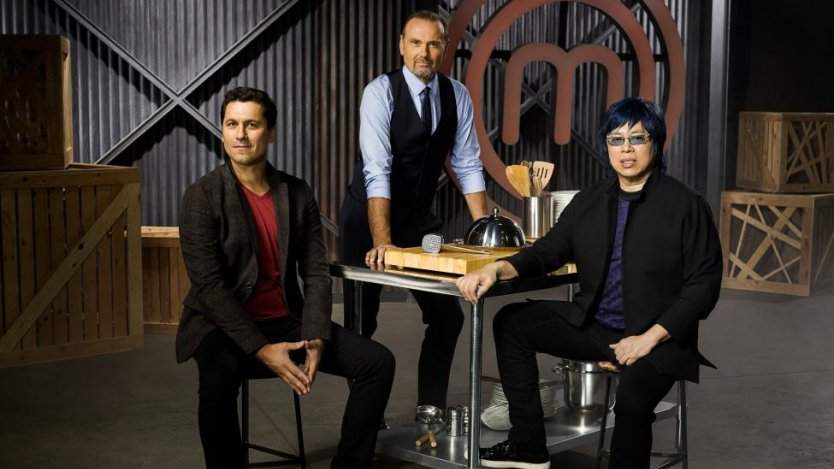There’s no doubt about it: most people cannot do what chefs do. The hours are long, the kitchen is hot and there’s no sympathy for working with the flu or a cut so deep that it’s barely held together with super glue.
But, that doesn’t stop talented home cooks from trying to cook their hearts out on national television and showing Canada what they’re made of. MasterChef Canada showcases the best home cooks in the country, 50 of them, to be exact, and puts them through rigorous challenges that test their food knowledge and techniques to find the best of the bunch.
While the challenges are understandably tailored to amateurs, judges Claudio Aprile, Michael Bonacini and Alvin Leung set the expectations high, see many similarities between the contestants and professional chefs — from their inspirations to letdowns — and emphasize the common denominator of simply creating good food.
“If you were to ask any chef where it all began for them, I think they would all answer in the same way, that it was at home. There are very few chefs that would respond by saying, “I fell in love with cooking when I went to a Michelin-star restaurant with my family,’” says Aprile (of Origin Restaurant), one of the best chefs in Toronto, also known for using modernist techniques before it became ubiquitous. “Usually, the spark happens at home, in a home kitchen, with your mom, with your dad, or your grandma. There’s some incredibly talented home cooks out there that never had the courage or the opportunity to step out of their normal career paths and take on cooking.”
MasterChef Canada lets home cooks step out of their comfort zones and into arduous situations, which can be unforgiving.
“You never know what ingredient is coming at you, the clock is always ticking, and just one wrong step causes the person who was going to put out an amazing dish to fail; it’s like being in a real kitchen,” says Bonacini, chef and partner of Toronto's Oliver and Bonacini restaurants, which include the celebrated Auberge du Pommier and Canoe. “It is time demanding and the pressure is on.”
In the competition, contestants have to make the best of what they’re given, even if it means unfamiliar ingredients that they may have never eaten. However, at home, Leung encourages home cooks to be adventurous and take the time to experiment.
“If you don’t understand it, do a bit of research on it before you start cooking with it. There’s so much going on in the supermarkets right now; it’s amazing,” says Leung. “Go to a restaurant and try an unfamiliar ingredient done by a professional. By going to a restaurant where they use a lot of ingredients, you can learn a lot about that ingredient.”
Knowledge of ingredients is only part of the equation. Equally important, if not more important, is technique, which is probably the harder part for home cooks to master. However, with high-tech equipment becoming more and more accessible to home cooks, nothing stops them from toying around and turning the kitchen into a serious lab.
Leung, who owns and runs the kitchen in one of Hong Kong's best restaurants, Bo Innovation, understands the appeal and the importance of balancing molecular gastronomy with classic techniques.
“With the Internet nowadays, you have access to any recipe, any method, any technique you want [to learn about]; all the information is there for you to search, but I think you should learn to walk before you run,” cautions Leung. “If you don’t know how to cook properly, then I wouldn’t suggest you go into molecular [gastronomy]. You need to know flavours and you need to know techniques before you go into something in the next level.”
There is sure to be surprises, upsets and heartbreaks in the show, but in the end, the judges all had the same piece of advice for home cooks: keep fuelling the passion and keep exploring the food and dining scenes that Canada offers. If this intense competition doesn't foster the love for cooking, nothing will.
Where Claudio Aprile eats in Toronto
The food scene here in Toronto has never been more exciting. There’s just so many great places to go and experience incredible cuisine.
I really like Marben a lot. I like what Simon Benstead’s doing there. He’s always reinventing the space. That’s one of my favourites and that’s probably at the top of my list. Obviously, I’m biased. I do go to Origin a lot, the one on King Street. BarChef is one of my favourite places to go for a really innovative cocktail. They do incredible things there. Another one is Chantecler; I really like what Jonathan Poon is doing there.
What Alvin Leung eats when he visits Canada
When you go to certain countries, try to experience what you can only get in that country. Firstly, I really enjoy prime rib, so I always go to places with it because I can’t get it in Hong Kong. There’s not a big demand for it, so there are not that many places that serve proper prime rib.
When I’m here, a nice deli is something that I would go for. You can’t get that in Hong Kong.













